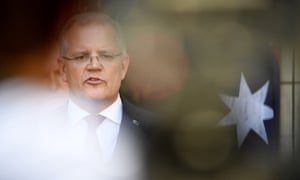The prime minister thinks his success has changed Australians. It hasn’t, and he sticks with that belief to his political peril
Here’s
a little story about hubris: an Australian prime minister wins a
federal election no one gave him a chance in after running a
relentlessly negative campaign against an opposition that bit off way
more policy than the public was prepared to chew.
The victory gave the leader enormous political authority within his caucus, the sense of invincibility in the public’s eyes and the enduring love of his base, emboldening him to let loose with his plan to remake Australia.
He treats the vanquished with contempt, which seems their due given their implosion, all the while ignoring the fact that it was they, not he, who had determined the result. And three years later it’s all over, a defeat so crushing that it set the tone for the next decade.
Scott Morrison’s no Paul Keating,
but he risks falling into the same trap after an unexpected miracle
victory. Because when the deafening, delirious cheers from a win you
don’t expect subside, is it any surprise you wake up with a case of tin
ear?The victory gave the leader enormous political authority within his caucus, the sense of invincibility in the public’s eyes and the enduring love of his base, emboldening him to let loose with his plan to remake Australia.
He treats the vanquished with contempt, which seems their due given their implosion, all the while ignoring the fact that it was they, not he, who had determined the result. And three years later it’s all over, a defeat so crushing that it set the tone for the next decade.
Of course the difference is that Keating’s mistake was to make Australia bigger than it was ready to be: willing to be engaged in its region, ready to make peace with its history, prepared to sever the constitutional ties with the motherland.
For Morrison it’s all about making Australia smaller: denying both its history and its present, cutting itself off from the world and, as I’ve argued previously, stifling any form of organised dissent.
But as figures in this week’s Essential Report show, although Morrison may be willing his “quiet Australians” to remake themselves in his image, they really haven’t changed at all.
When it comes to climate change – despite all the self-serving assertions that Labor’s ambition cost it power – people still believe the government is asleep at the wheel. In fact the number of people thinking the government isn’t doing enough is at an all-time high of 60%, significantly up from pre-election polling.
The last leader to try this line on, Tony Abbott, generated way more purchase. Back then half the population rejected the link. Now 60% see the connection, and most of these reckon now’s a reasonable time to have the discussion.
Yet he blusters away, believing he has a mandate to refuse to confront the science that places more and more Australians at risk every year.
Meanwhile he’s is desperate to airbrush the final days of the previous parliament from the record, particularly its historic failure to end cruelty on Manus and Nauru.
The legislation sponsored by the interim member for Wentworth, Kerryn Phelps, that pushed forward the novel idea that doctors should determine whether a soul under Australia care should receive medical attention is a line in the sand for the PM.
Again it appears he has mistaken his election win with a change in mood for the Australian public because the support for these measures, or something even more humane, remains above 60%.
For all the talk on risks to sovereignty and the steady leaks of disclosures about the nature of the ailments of some of those seeking care, the debate has pushed up two points for each of the extremes, at the expense of the status quo. But really, nothing has changed.
Here’s the truth behind these figures: the election result did not fundamentally change Australia or how Australians see themselves.
They may have balked at Labor’s expansive agenda but they do want action on climate change and they are more than ever ready to think the government is not doing enough. And they want to see some basic humanity when it comes to asylum seekers.
And that’s not all.
The Australia that wondered why the government held out against a banking royal commission while laying into the unions before the election is the same Australia wondering why deregistering unions is now the government’s top legislative priority.
The Australia that demanded that the government take meaningful action on family violence before the election will not now cheer on as the PM hands a review into the family law system to Pauline Hanson.
The Australia that demanded the NDIS be funded adequately before the election is the same Australia that will see any attempt to prop up the budget with unspent funds as fiscal abuse of the needy.
The government won the election by promising to do nothing. End of story.
Like Keating before him, Morrison will believe his victory has changed Australia at his own political peril.
• Peter Lewis is an executive director of Essential

No comments:
Post a Comment